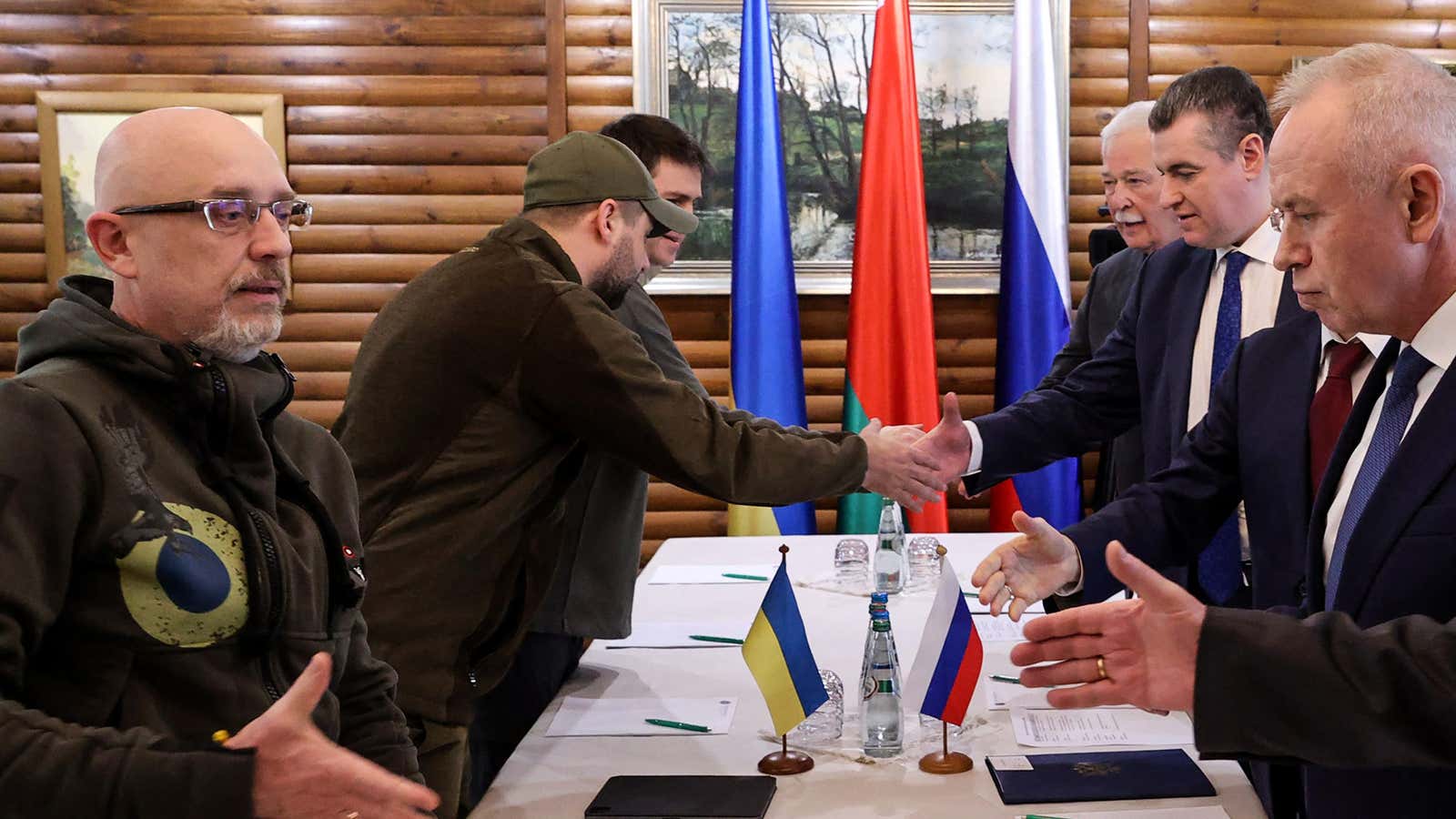Good morning, Quartz readers!
Was this newsletter forwarded to you? Sign up here. Forward to the friend who wouldn’t budge without their pets.
Here’s what you need to know
Ukraine and Russia met for round two of talks. The two delegations agreed to set up corridors for civilians to leave Ukraine and humanitarian aid to enter, even as Russia continued to besiege its neighbor’s southern cities.
The US sanctioned more Russian oligarchs. It’s another blow for Russian president Vladimir Putin’s cronies, who have creative ways of hiding their wealth.
Georgia and Moldova want to be in the EU. The request follows an application earlier this week from Ukraine, which has seen 1 million of its residents turned into refugees in the past week.
Cities in Taiwan went dark. A blackout, caused by a dysfunctional power station, affected 5 million households during morning rush hour yesterday.
Emmanuel Macron will run for re-election. The French president—who also spoke with Putin yesterday—had delayed his announcement because of the war in Ukraine.
Grab lost $1 billion. The Singaporean ride hailing and delivery startup blamed investment costs for its rough quarter.
A former Nissan executive was found guilty of hiding pay data. Greg Kelly was convicted in Japan of helping his former boss, Carlos Ghosn, keep the information from regulators.
What to watch for
China’s biggest annual political meetings, known as “two sessions,” will convene today and tomorrow. Thousands of the country’s political elites will gather in Beijing to discuss issues including China’s GDP target, national budget, defense spending, and how to handle the country’s risky property sector.
This year’s two sessions is expected to also provide a glimpse of Beijing’s thinking on the Russian invasion of Ukraine. The government could reassess its foreign and domestic policies in response to the crisis. It could also shift its priority more to developing self-reliance, especially in areas where Russia is being sanctioned, including the payment system and semiconductors, according to experts from German think tank Merics.
A speech by China’s foreign minister Wang Yi next Monday (March 7) will be watched closely for any clues about China’s stance on Ukraine and the direction of the currently highly strained China-US relations.
Ukraine’s tech sector is in danger
“I’ve seen what Russia did in the eastern Ukrainian regions and in Crimea as well. You can’t do any business over there. It’s always scorched earth.” —Vlad Panchenko, CEO of DMarket, a Ukrainian metaverse developer
Ukraine’s second largest city, Kharkiv, is both the hub of its $6.8 billion fast-growing tech sector and one of the country’s most vulnerable assets. Before the current crisis, the industry was markedly resilient, surviving the Russian invasion of Crimea in 2014, then a devastating Russian cyberattack known as NotPetya in 2017. When Ukraine’s GDP fell 4.4% in 2020, revenue from its outsourced IT services grew more than 20%.
Ukrainian-born startups have mostly relocated, though it’s not clear if they’ll ever return. Companies that provide outsourcing for Western firms are more at risk of shutting down completely, if they haven’t already.
Maersk is thinking outside the container
In January, Mediterranean Shipping Company (MSC) became the world’s biggest shipping line by container capacity, unseating juggernaut Maersk from the top spot it’s held for more than 25 years. But Maersk wasn’t fazed—it’s looking landward. ✦ Learn more about Maersk’s pandemic-charged transformation. Not yet a member? Try it free for seven days.
Handpicked Quartz: The question edition
📺 Where can we watch the show where Ukraine’s current president pretended to be a fictional one?
⛔️ How can Europe quickly reduce its reliance on Russian gas?
💺 Is Uganda’s Entebbe airport at risk of seizure by China?
😨 How do we continue working in the face of catastrophe?
👩👧👦 Can you add “parenting” to your resume now?
🛰 How big is the US space economy?
Surprising discoveries
South Korea’s presidential candidates aren’t just using hair insurance to sway young voters. Nothing says democracy like a deepfake.
Windows updates are going eco-friendly. Microsoft will try to use low-carbon energy sources for installs.
Fly me (or my name) to the Moon. NASA is adding people’s monikers to a flash drive aboard Artemis I Mission.
The Massachusetts Institute for Technology has a room full of free bananas. And faculty are just finding out.
Would you scoop coagulated fish out of an ice cream tub? Yeah, neither would most people, which is part of the reason why we have fish sticks. Listen to the backstory of the fried, frozen, finger food in the newest episode of the Quartz Obsession podcast.
🐟 Listen on: Apple Podcasts | Spotify | Google | Stitcher
Clarification: Yesterday you may have received a subject line that said NATO was arming Ukraine. We were referring to NATO countries, not NATO the organization itself.
Our best wishes for a productive day. Send any news, comments, space-bound names, and free bananas to hi@qz.com. Get the most out of Quartz by downloading our iOS app and becoming a member. Today’s Daily Brief was brought to you by Jane Li, Camille Squires, Nicolás Rivero, Morgan Haefner, Susan Howson, and Liz Webber.
